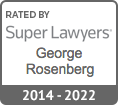Rosenberg Mediations offers mediation services throughout California for parties involved in all types of motor vehicle accidents, premises liability, catastrophic personal injuries and wrongful death accidents, construction accidents, employment termination and discrimination disputes, business litigation, dangerous conditions of public property, defective products, insurance coverage and bad faith, and professional and medical malpractice. In order to streamline the process and promote effective resolutions, George M. Rosenberg asks that parties and their attorneys adhere to the following mediation procedures:
Before Mediation
Before a mediation session can begin, it is essential for all of the parties to be properly prepared. This includes gathering and exchanging any information that will be helpful for the mediator and for the parties in making realistic settlement decisions. All of the parties necessary for a settlement to occur should be present during each mediation session. This includes all decision-makers, witnesses, attorneys, and other essential persons. If a party wishes to be legally represented during the mediation, he or she should retain an attorney prior to beginning any mediation sessions and ensure that the attorney has all of the information needed to provide effective assistance during the mediation. In addition, the parties should prepare and submit briefs to the mediator prior to the mediation. Briefs should be received by the mediator at least three business days in advance of the first mediation session. The parties are encouraged to share their briefs with each other, and any particularly confidential information can be provided separately to the mediator.
During Mediation
In a standard mediation, the process begins with private discussions between the mediator and the individual parties and their attorneys. Depending on the circumstances of the case and what will be most beneficial for the parties, we may meet separately in private caucuses as well as jointly with all of the parties present. In a private caucus, the caucusing party may freely discuss confidential information that may assist the parties in working out a resolution, but which the party may not wish to make known in a joint session. As mediator, Mr. Rosenberg can help the parties evaluate the strength of their position during the caucuses and discuss realistic resolution options without sacrificing the party’s bargaining power in the joint sessions.
During the mediation, the parties should be prepared to thoroughly discuss all aspects of the case and summarize their positions. The parties are encouraged to utilize charts, audio or visual aids, oral presentations, witness testimony, and anything else that might be helpful in explaining their positions. The goal of these presentations is to provide enough information to clarify the parties’ positions, assist the mediator in conducting the mediation and making recommendations, and help the decision-makers make informed decisions.
After Mediation
Once a settlement is reached, Mr. Rosenberg will summarize the terms of the agreement, and the parties and their attorneys may draft and execute the agreement. If the parties do not reach a settlement during the initial mediation, they may follow up with further investigation and exchange of information, telephone caucuses with the mediator, or additional mediation sessions.
Southern California Mediations
With over 40 years of experience in the litigation process and 10 years as a mediator, George Rosenberg has the expertise to help parties reach effective settlement agreements. For additional information on the process or to schedule a mediation, contact Rosenberg Mediations today.

